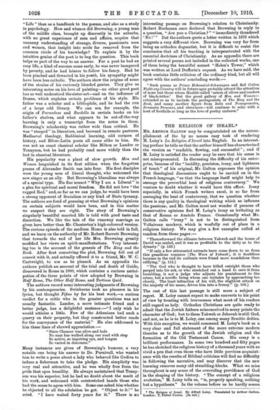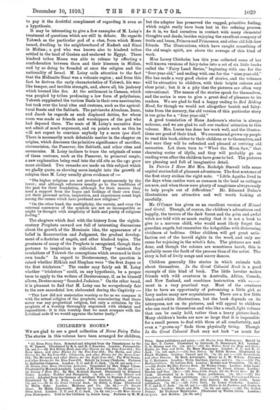THE RELIGION OF ISRAEL.*
Ma. ARTHUR GALTON may be congratulated on the accom- plishment of the by no means easy task of rendering M. Loisy's La Religion d'Israel into English. In an interest- ing preface he tells us that the author himself has characterised
the version as " readable, flowing, and successful " ; and if M. Loisy is satisfied the reader may be sure that his sense is not misrepresented. In discussing the difficulty of his enter- prise, because of the " lucidity, precision, irony, and lightness of touch" of his original, Mr. Galton expresses the opinion that theological discussions ought to be carried on in the French language, " so that the language itself might help to assuage the proverbial heat of religious controversy." We venture to doubt whether it would have this effect. Irony especially, in which French writers excel, is so far from assuaging the heat of controversy, that we question whether there is any quality in theological writing which so inflames the passions; and Mr. Galion must not wonder if persons of conservative opinions find M. Loisy's irony as irritating as that of Renan or Anatole France. Occasionally what Mr. Galton calls "irony" is not to be distinguished from Voltairean mockery, which is woefully out of place in a religious history. We may give a few examples culled at random from these pages :—
"Thenceforward the alliance between Yahweh and the house of David was sealed, and it was as profitable to the deity as to the dynasty." (p. 123.) "If only a few attenuated extracts have come down to us from this grandiose romance [The Wars of Yahweh], it is doubtless because in the end its contents were found more scandalous than edifying." (p. 112.)
" The God who is thought to have killed outright those who peeped into his ark, or who stretched out a hand to save it from trembling, is not a judge who adjusts his punishment to the crime, but a terrific being whom one irritates by approaching too closely. The least infraction of his will, the slightest attack on the majesty of his name, drives him into a frenzy." (p. 103.)
The rest of this last passage is still more a subject of regret. M. Loisy cannot expect to make converts to his point of view by treating with irreverence what most of his readers still regard as holy. Orthodox Christians are quite ready to admit that the Jewish fathers misconceived in many points the character of God ; but to them Yahweh or Jehovah is still God, and not, as he is to M. Loisy, one among many Semitic deities. With this exception, we would commend M. Loisy's book as a, very clear and full statement of the more extreme modern theories as to the growth of the Jewish religion and the formation of the Old Testament Canon. His essay is a brilliant performance. In some two hundred and fifty pages he has sketched the religious history of a thousand years with so vivid a pen that even those who have little previous acquaint- ance with the results of Biblical criticism will find no difficulty in following the narrative, and may discover that the new learning removes many old stumbling-blocks. What we miss throughout is any sense of the overruling providence of God in the shaping of the history. " The concept of a religious evolution," M. Loisy tells us, " is, properly speaking, nothing but a hypothesis." In the volume before us he hardly seems
• The Religion of Israel. By Alfred Loisy. Translated by Arthur Galton. London : T. Fisher Unwin. 15s. net.]
to pay it the doubtful compliment of regarding it even as a hypothesis.
It may be interesting to give a few examples of M. Loisy's treatment of questions which are still in debate. He regards Yahweh as the particular god of a clan, from which Moses issued, dwelling in the neighbourhood of Kadesh and Sinai in Midian ; a god who was known also to kindred tribes settled in the land of Goshen and enslaved to Egypt. These kindred tribes Moses was able to release by effecting a confederation between them and their kinsmen in Midian, and by so doing he founded at once the religion and the nationality of Israel. M. Loisy calls attention to the fact that the Midianite Sinai was a volcanic region ; and from this fact he derives the early characteristics of Yahweh, his war- like temper, and terrible strength, and, above all, his jealousy which burned like fire. At the settlement in Canaan, which was peopled by tribes professing a low form of polytheism, Yahweh supplanted the various Baals in their own sanctuaries, but took over the local rites and customs, such as the agricul- tural feasts and the Sabbath. The patriarchs Abraham, Isaac, and Jacob he regards as such displaced deities, for whom room was made as friends and worshippers of the god who had deposed them. The scale of M. Loisy's narrative does not admit of much arguments and on points such as this he mill not expect to convince anybody by a mere ipse dizit. There is necessarily much debatable matter in the chapter on origins, which discusses the primitive significance of sacrifice, circumcision, the Passover, the Sabbath, and other rites and ceremonies. M. Loisy inclines to trace the originals of some of these customs, such as the Passover, to primeval magic, a new explanation being read into the old rite as the aga grew more civilised. Two remarks are made on this subject which we gladly quote, as showing more.insight into the growth of religion than M. Loisy usually gives evidence of :- " The higher religions are not produced spontaneously by the lower; and although reformers usually go to the traditions of the past for their foundation, although for their success they need a support from the hopes and feelings of their own time, yet their personal action, inspiration, and experiences count high among the causes which have produced new religions."
" On the other hand, the multiplicity, the variety, and even the external coarseness of the symbols are not so incompatible as might be thought with simplicity of faith and purity of religious keling."
The chapters which deal with the history from the eighth- century Prophets onward are full of interesting discussions about the growth of the Messianic idea, the appearance of a belief in Resurrection and Judgment, the gradual develop- ment of a doctrine of angels, and other kindred topics. The greatness of many of the Prophets is recognised, though their pretence to inspiration is ridiculed. They "mistook for revelations of Yahweh the conceptions which swarmed in their own beads." In regard to Deuteronomy, the question is raised whether Hilkiah and Shaphan. were "the first dupes or the first tricksters." The reader may fairly ask M. Loisy whether " tricksters " could, on any hypothesis, be a proper term to apply to the writers of Deuteronomy, if, as he himself allows, Deuteronomy " founded Judaism." On the other hand, it is pleasant to find that M. Loisy can be scrupulously fair to the new sacerdotal law, elaborated during the Captivity :-
" This Law did not materialise worship so far as we compare it with the actual religion of the prophets, remembering that there never was any prophetical religion, but only a criticism by the prophets of a worship thoroughly engrained with idolatry and superstition : it is this worship that we must compare with the Levitical code if we would appraise the latter justly.'



























































 Previous page
Previous page